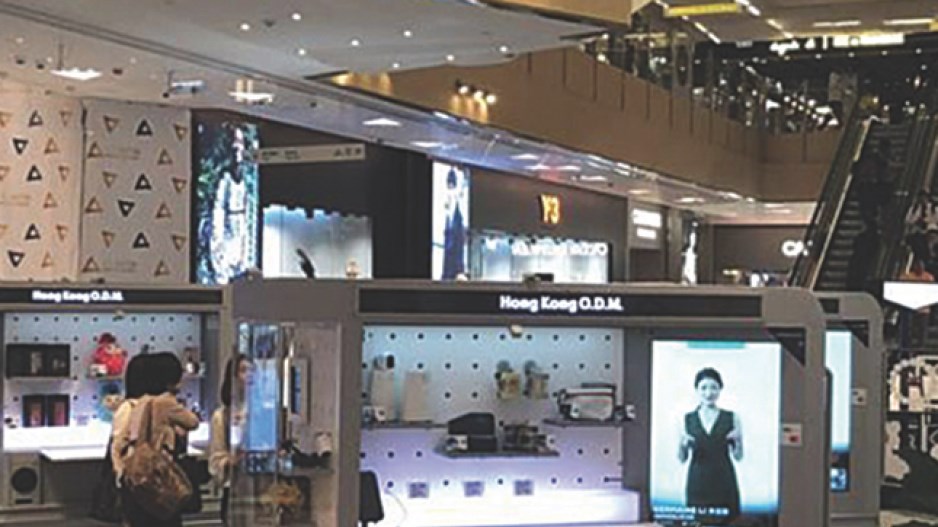A Vancouver-based company in the cannabis sector will be the first Canadian brand to use unmanned pop-up kiosks, equipped with artificial intelligence (AI) and facial-recognition technologies, instead of traditional retail to push for market share in China.
Yield Growth Corp. (CSE: BOSS), which produces a number of health and beauty products infused with hemp-seed and hemp-root oil, will partner with Hong Kong’s PopSquare to place the kiosks at three luxury shopping mall locations in the Asian city for three months starting in June.
CEO Penny Green said customers will be able to try, learn about and ultimately purchase items like lip balms and facial serums through these kiosks, which are linked up with Chinese social media and e-commerce platform WeChat. Plans are already underway to expand the presence of Yield Growth’s marquee brand, Urban Juve, to cities like Beijing and Shanghai in the following months.
“When I saw this idea, I thought it was brilliant,” Green said. “I have a background in mobile payment, so I was very familiar with WeChat as an amazing app with a billion users. But it’s also interesting to look at the relationship between online commerce and retail, and when you have an e-commerce platform, this is the latest and most efficient way to reach and acquire new customers without necessarily having to set up full retail.”
Industry officials are betting on China’s large market, as well as a historical understanding of the hemp branch of the cannabis industry. Washington-based New Frontier Data puts hemp sales in China at $1.1 billion in 2017 (almost a third of the $3.1 billion market globally), and that figure is expected to rise to $1.5 billion by 2020.
Still, China and the rest of Asia have been a tough market for Canada’s newly enabled cannabis sector to crack – mainly because hemp is largely used for its fibre in these markets. Consumption remains a taboo issue in most social circles, and while hemp-seed oil is widely legal, the status of hemp-root oil, which is new to the market, is murkier.
That, however, isn’t deterring Green, who said Yield Growth has secured legal opinions in Canada, the United States, mainland China and Hong Kong (where cannabis-root oil has been legalized) to address concerns from regulators and consumers.
“The only difficulty we may find is when we talk to major retailers in Hong Kong, just because our ingredients are so new that people want to make sure it’s legal,” Green said. “It’s such a new ingredient that we just have to assure them it’s legal, and that it’s not going to get people high because it is not psychoactive in any way…. And we have the legal opinions that we have been sending to retailers; that’s about as good as it can get.”
Another B.C. cannabis company, Vernon-based True Leaf Medicine International Ltd., has been exploring ways to enter the Asia market with its hemp-seed-based products, and its strategy has focused on pet-health this year. Company officials said its “paw-in-the-door” strategy of acclimatizing and familiarizing consumers with hemp-seed products first by providing pet-care products is already seeing a good response in places like India, China and Japan, where distribution partners have already been secured or are in the negotiation process.
True Leaf executive vice-president Tenzin Khangsar said the key is to gain the trust of local regulators and society at large in these markets before introducing the idea of something stronger (like CBD, or cannabidiol, oil-based items that are illegal in most of the world). But Khangsar said he has no doubt that Asia, despite the taboos, can be a major market for hemp-seed-based products fairly quickly.
“There is a taboo, and the way to combat that is to be a trusted, credible source of education,” he said. “We’d like to say we are not in the business of selling, but in the business of educating. This is a brand new product category, no different than Uber or Airbnb. People were hesitant to use those products at first, so there’s lots of educating required, and that’s where we spend the majority of our time.”
Other Canadian cannabis industry insiders agree that education and time are key factors in overcoming historical and social taboos placed on the substance, noting efforts like the National Institute for Cannabis Health and Education (NICHE) and its multicultural outreach programs in Canada are already underway.
“I think, in five years’ time, you will definitely see products like CBD considered as natural health products used like other herbal remedies,” said NICHE founder and board member Barinder Rasode. “Right now, people still have reasons to be concerned because we haven’t done enough education in the communities.”•




